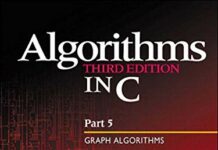
Ebook Info
- Published: 2013
- Number of pages: 848 pages
- Format: PDF
- File Size: 31.08 MB
- Authors: Robert Sedgewick
Description
Despite growing interest, basic information on methods and models for mathematically analyzing algorithms has rarely been directly accessible to practitioners, researchers, or students. An Introduction to the Analysis of Algorithms, Second Edition, organizes and presents that knowledge, fully introducing primary techniques and results in the field. Robert Sedgewick and the late Philippe Flajolet have drawn from both classical mathematics and computer science, integrating discrete mathematics, elementary real analysis, combinatorics, algorithms, and data structures. They emphasize the mathematics needed to support scientific studies that can serve as the basis for predicting algorithm performance and for comparing different algorithms on the basis of performance. Techniques covered in the first half of the book include recurrences, generating functions, asymptotics, and analytic combinatorics. Structures studied in the second half of the book include permutations, trees, strings, tries, and mappings. Numerous examples are included throughout to illustrate applications to the analysis of algorithms that are playing a critical role in the evolution of our modern computational infrastructure. Improvements and additions in this new edition include Upgraded figures and code An all-new chapter introducing analytic combinatorics Simplified derivations via analytic combinatorics throughout The book’s thorough, self-contained coverage will help readers appreciate the field’s challenges, prepare them for advanced results—covered in their monograph Analytic Combinatorics and in Donald Knuth’s The Art of Computer Programming books—and provide the background they need to keep abreast of new research. “[Sedgewick and Flajolet] are not only worldwide leaders of the field, they also are masters of exposition. I am sure that every serious computer scientist will find this book rewarding in many ways.”—From the Foreword by Donald E. Knuth
User’s Reviews
Reviews from Amazon users which were colected at the time this book was published on the website:
⭐I am a first year graduate student in mathematics, so keep that in mind if you’re trying to generalize my review. I use nearly all the math discussed in the text for analytic number theory (I rarely program), but this book gives an especially nice treatment of the combinatorial mathematics. I really get excited every time I have to open this book.I typically learn best from books, so I have a good sense for what a book should feature for me to learn the material as quickly and effectively as possible. It’s really a drag when something as superfluous as style or a purist aesthetic makes reading sluggish or just impossible to learn from. I want a book to have many problems (ranging between medium to very hard/open problems), solutions in the back, examples to make the more difficult concepts clear, both historical and modern motivations for the material, and clean, linear descriptions. This book hits all of these except the “solutions in the back” part. Despite this one “flaw”, however, this book has other great features that compensate. For example, the typesetting is fresh and makes the text more engaging. Also, there are very beautiful graphs and great reference tables. It is really a wonderful book — the authors clearly were purposeful in the design of this text.
⭐Written in the spirit of Knuth.
⭐If you would like to learn the foundation of computer science, this book is for you!
⭐Clear but strict intro into combinatorial Algorithm Analysis. One of the best books for the intermediate level.
⭐Very good and complete for developers and Algorithm learners
⭐Amazing book
⭐You can’t beat this book for studying algorithms.
⭐This is a highly digestible math book and the focus is on a formal approach of accurate analysis (not just worst case or average case) for most algorithms. It is not a substitute of the CLRS or other popular textbooks, it is a somewhat different approach. The text tells you what you need to worry about when analyzing algorithmic topics, and explains the “how”s very clearly and nicely paced. The effect is that while reading, I never have the dread that I am not able to finish a typical thousand-page theory book. It prepares you for the author’s Analytic Combinatorics and Knuth’s TAOCP, but I find it equally useful just to better understand algorithms overall.
⭐Very Nice Book and seller is also prompt
⭐Esta obra completa el vacío existente entre la enseñanza formal de un lenguaje de programación y el conocimiento de los algoritmos sobre qué se debe programar. Hoy en día cometemos el error docente de enseñar a decir, sin enseñar antes qué decir.Il libro è davvero notevole, completo, formale ed adatto ad un pubblico che mastica abbastanza bene la matematica discreta e le dimostrazioni di teoremi. Ne sconsiglio l’acquisto digitale in quanto la lettura sul mio dispositivo kindle paperwhite non si è rivelata confortevole. Magari i possessori di altri dispositivi dissentono da questa opinione.It needs a good background of math. Althought I haven’t finished the book yet, but I found it unique in teaching solving recursive numeric functions. I constantly learn something new from it.
⭐This book leaves out mathematical details without providing in-depth and clear explainations for them. The author may put it into a throughly self-contained style.The authors intend to teach generations to come, but they should add sufficient mathematical details in crutial places. The volume of the book has to be expanded with independent insights incorporated.
Keywords
Free Download Introduction to the Analysis of Algorithms, An 2nd Edition in PDF format
Introduction to the Analysis of Algorithms, An 2nd Edition PDF Free Download
Download Introduction to the Analysis of Algorithms, An 2nd Edition 2013 PDF Free
Introduction to the Analysis of Algorithms, An 2nd Edition 2013 PDF Free Download
Download Introduction to the Analysis of Algorithms, An 2nd Edition PDF
Free Download Ebook Introduction to the Analysis of Algorithms, An 2nd Edition


